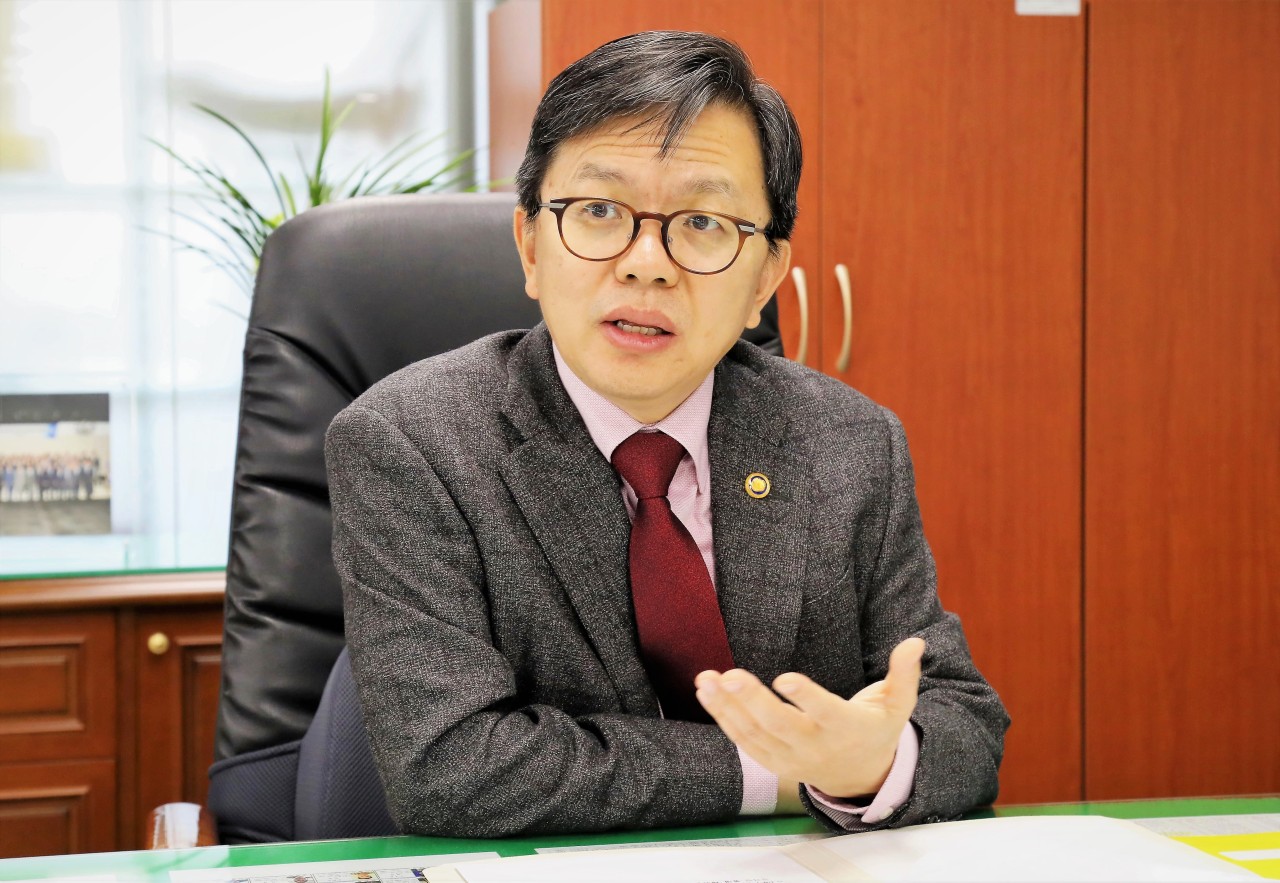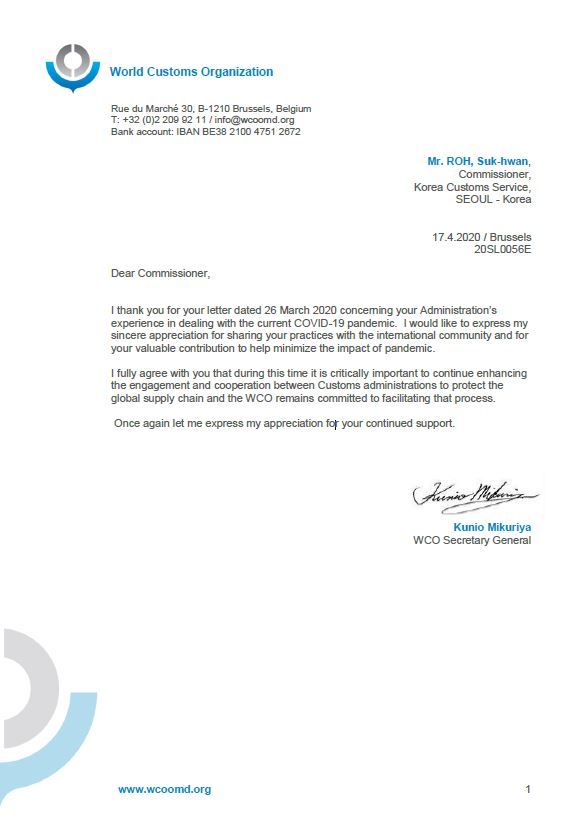 |
Korea Customs Service Commissioner Roh Suk-Hwan speaks during an interview with The Korea Herald. (KCS) |
South Korea has grabbed global attention for its early-stage prevention handling of the novel coronavirus pandemic with relatively little impact on the economy.
Driving such innovation, along with the public health authorities, was the country’s customs agency, which promptly adjusted the clearance system to deal with the supply issues caused by the crisis.
“Dedicated to safeguard the global supply chain, we have established and operated special customs clearance centers around the globe to support trade of raw materials at all times,” Roh Suk-hwan, commissioner of the Korea Customs Service, said in an interview with The Korea Herald.
The KCS’ system, operated around the clock in emergency mode, focused mostly on alleviating the clearance process of sanitary products, medical devices and key raw materials for domestic manufacturers.
Responding to the recent surge in the volume of imported raw materials, following a monthlong shutdown of Chinese factories, Korea’s customs officials kicked off emergency clearance task forces, starting with key posts such as Incheon Airport, Incheon Port and Pyeongtaek Port.
The KCS also eased the procedures for cargo, allowing shipments to be directly transported to manufacturing plants without making entries into the terminal upon arrival.
“We have been making the best use of our hotlines with trading partners in order to resolve clearance delays not only here but also abroad,” Roh said.
The KCS earlier sent a letter to the General Administration of Customs of China, asking for cooperation in bilateral trade.
Considering the possible absence of system administrators and office closures due to the pandemic, the office also set up an emergency response manual for its automated customs solution: UNI-PASS.
In preparation for contingencies such as the isolation of public officers or outsourced workers, the manual describes step-by-step countermeasures in 11 stages, depending on the seriousness of the situation.
The KCS’ swift actions also stood out when the Korean government sent charter flights to evacuate its citizens from other countries.
While implementing a special simplified customs clearance procedure for evacuees, the office also offered sterilizing services for their belongings and transferred suspected patients to quarantine officials.
In an extended effort to prevent secondary infections, the KCS effectuated special safety guidelines for its own employees, as well as those working in duty-free shops, warehouses, airports and seaports.
Under the guidelines, pregnant workers and long-distance commuters were allowed to work from home or in specially installed centers in cities such as Seoul and Daejeon.
Such efforts and consequent achievements have won the KCS the recognition from the international community.
In late March, the KCS sent out a list of its measures aimed at mitigating the damage inflicted by the pandemic and how its collaboration with other agencies has helped minimize the impact of the pandemic.
 |
A letter sent by World Customs Organization Secretary-General Kunio Mikuriya to KCS Commissioner Roh Suk-Hwan (KCS) |
On April 17, the Korean office received a letter of gratitude from Kunio Mikuriya, secretary-general of the World Customs Organization for sharing its practices.
“I would like to express my sincere appreciation for sharing your practices with the international community and for your valuable contribution to help minimize the impact of pandemic,” wrote Mikuriya.
“I fully agree with you that during this time it is critically important to continue enhancing the engagement and cooperation between customs administrations to protect the global supply chain and the WCO remains committed to facilitating that process.”
For Korean exportersThe pandemic, as well as continued protectionism, has exposed vulnerability of the Korean economy in the global supply chain.
To support Korean exporters’ entries to new markets, the customs agency will strive to expand the mutual recognition agreement of the authorized economic operator system, designed to simplify customs clearance processes and provide other cost-saving benefits for certified companies of respective countries, he said.
South Korea signed such mutual agreements with 22 countries, the largest in numbers. The list includes the US, China, Japan and India. The agency is looking for an opportunity to sign the agreement with emerging markets including Russia and Vietnam to help Korean exporters secure global competitiveness.
In support of the South Korean government’s drive to explore new markets, the agency plans to strengthen its efforts to forge mutual partnership with related organizations in Southeast and Central Asian countries.
The plan not only includes expanding the use of UNI-PASS in Southeast and Central Asian countries, but also strengthening diplomatic networks by holding a high-profile meeting with commissioners from respective countries, Roh said.
Other legal frameworks under free trade agreements, both on bilateral and multilateral levels, can also support Korean exporters, he added.
The commissioner was referring to the electronic origin data exchange system, or EODES, which allows customs agencies to process certificates of origin through electronic platforms.
The measure is devised to speed up customs procedures for exporters and prevent forgery of documents. The Korean agency launched the system with its partner organization in China in 2016 and Indonesia this year. “We are currently in talks with (agencies) in India, Vietnam and Thailand to launch (the EODES system),” he said.
Looking back on the 50 years of KCS history this year, Roh said the agency will seek ways to provide convenience to Korean people and exporters for future.
Public calls for more effective customs administration have been growing amid the changing trade environment by the pandemic, the rise of cross-border purchases of goods and frequent overseas travels by individuals, he said, adding that he aims to build safer and more convenient customs service.
“We hope to bring meaningful changes (within the organization) by listening to people, figuring out changes from the new environment, and doing the best we can,” he said.
“Before everything, for now, we will use all administrative means necessary to minimize the fallout from COVID-19 on the economy.”
By Jie Ye-eun and Lee Kwon-hyoung
(
yeeun@heraldcorp.com) (
kwonhl@heraldcorp.com)





![[Herald Interview] 'Trump will use tariffs as first line of defense for American manufacturing'](http://res.heraldm.com/phpwas/restmb_idxmake.php?idx=644&simg=/content/image/2024/11/26/20241126050017_0.jpg)


![[Health and care] Getting cancer young: Why cancer isn’t just an older person’s battle](http://res.heraldm.com/phpwas/restmb_idxmake.php?idx=644&simg=/content/image/2024/11/26/20241126050043_0.jpg)
